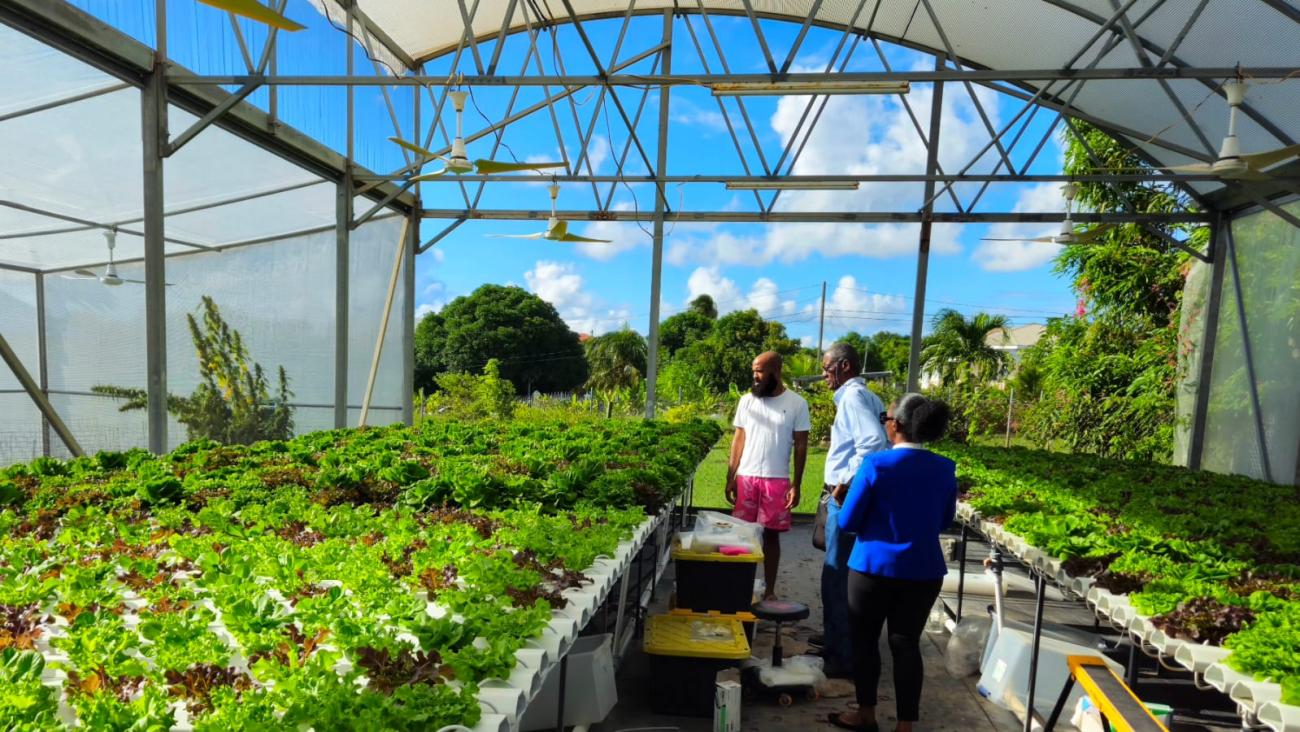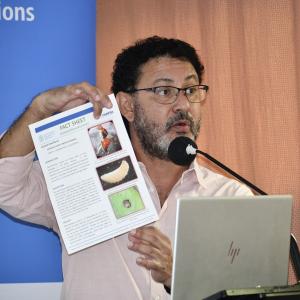Basseterre, Saint Kitts and Nevis – The Food and Agriculture Organization of the United Nations (FAO) is playing a pivotal role in the transition of vegetable farming in Saint Kitts and Nevis from traditional open-field methods to protected agriculture using greenhouse structures, significantly increasing the production of high-value, priority crops. Through its long-standing partnership with the Ministry of Agriculture and drawing on resources from the Technical Cooperation Programme (TCP), FAO has provided comprehensive technical training for farmers and extension officers to strengthen production practices, capacity building for government staff in value chain development, and the provision of essential materials such as greenhouse components, insect nets, and harvest crates.
The implementation of the Plant Protection Act and the Saint Kitts and Nevis Agriculture Growth and Transformation Strategy 2022–2031 has provided a solid policy foundation for structured development within key value chains where the market is particularly encouraging to local farmers. In some sectors, farmer earnings have seen marked improvement, bolstered by investments from both the public sector and development partners.
In Nevis, a group of progressive farmers has been leading the shift to greenhouse-based vegetable production, particularly lettuce, embracing innovation to improve consistency and quality. With training support from FAO, they have adopted Good Agricultural Practices (GAPs), Integrated Pest Management (IPM), and climate-smart methods. A key intervention was the introduction of closed-circuit hydroponic systems and environmental and water sensors in three greenhouses, enabling precise, data-driven management of crop nutrition, and irrigation. Over the years, the interventions have had a measurable impact. Data from the Department of Agriculture shows that from a baseline of 4,940 kg in 2019, lettuce production volumes rose dramatically to 19,536 kg in 2022 and 45,314 kg in 2023, driven by better practices, and upgraded technologies.
These innovative technologies such as the sensors and hydroponic systems are now being further advanced through a focused FAO project titled “Strengthening Protected Agriculture to Improve People’s Livelihoods, Food and Nutrition Security”. The project aims to rehabilitate and enhance greenhouse structures in both Saint Kitts and Nevis, many of which suffered damage from hurricanes.
Looking to the future, the integration of digital tools like environmental, soil and water sensors is setting the stage for more intelligent and responsive agricultural practices. According to Mr. Melvin Medina, FAO Plant Production and Protection Officer, “Farmers who adopt digital sensor technologies will gain real-time access to data, enabling them to monitor key factors that directly impact crop yields and make timely, informed decisions.”
One such inspiring example is Mr. Richard Paris, a leading commercial greenhouse operator in Nevis, who experienced a significant boost in crop yields after integrating advanced sensor technology into his operations. By installing sensors to monitor key parameters such as air temperature, relative humidity, solar radiation, water pH, water temperature, dissolved oxygen, and electrical conductivity, he was able to pinpoint and address critical issues in real time. Leveraging this data, he implemented targeted improvements across his greenhouse systems. “I am moving to a climate-controlled environment with supplemental lighting to optimize seedling growth,” Mr. Paris explained. “And after removing the shade, I witnessed a dramatic improvement. My yields more than doubled within just 2 to 4 weeks.”
FAO’s collaborative efforts with the Ministry of Agriculture along with other partners have laid a solid foundation for sustained growth, increased farmer incomes, and more resilient food systems. As the country progresses toward its 2031 agricultural vision, the vegetable crop value chain driven by innovation, capacity development, and supportive policies emerges as a model of transformation for Small Island Developing States (SIDS).
For more information:
Melvin Medina Navarro
Plant Production and Protection Officer melvin.medinanavarro@fao.org
Jefferson Jaikissoon
Agricultural Value Chain Development Specialist jefferson.jaikissoon@fao.org
Marquita Sugrim
National Communications Consultant Marquitajuanne.sugrim@fao.org




